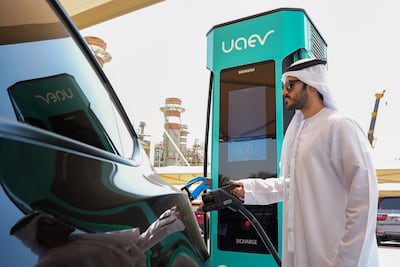After several years of rapid expansion, electric vehicle sales growth faces several challenges, but the overall EV sector remains promising, particularly in the Middle East, a report found.
“The sector currently faces numerous headwinds, including high electricity costs, inflation and reduced subsidies as governments shift their funding focus from vehicles to charging facilities,” said the introduction of the 2024 EV Charging Index report from global consultancy Roland Berger.
In particular, 2023 saw an overall EV sales slowdown, the report said. “Nevertheless, it should only be a matter of time before EV growth rates recover,” it added, also noting that sales in Middle East and South-East Asia markets were “showing rapid growth".
The charging index and study, according to Roland Berger, was based on industry interviews, primary research and a survey of 16,000 participants in 2024. The report, initially released in July, noted that one of the main obstacles to widespread EV adoption has been the range anxiety in the minds of many consumers, prompted by a sometimes patchy charging infrastructure.
“It’s a bit of a chicken or the egg situation,” said Arvind CJ, a partner at Roland Berger’s Dubai office during an interview with The National’s Business Extra podcast. “Consumers always say, ‘OK, I need to see chargers before I buy a vehicle.’”
The Americas and China saw a slight decline in charging sufficiency infrastructure, but the Middle East, Europe and other parts of Asia saw significant improvements, the report found.
“Saudi Arabia led the way, improving its ratio from 10.4 to 1.0, while the UAE jumped from 7.6 to 4.3,” the report stated, noting that lower numbers denoted better sufficiency.
“It’s a similar story for the ratio of vehicles to public chargers, with Europe and the Middle East the only regions to record an improvement.”
According to another recently released EV report from PwC, the UAE has about 2,000 public charge points throughout the country, with demand projected to reach 45,000 by 2035.
Back in May, a the UAE Ministry of Energy and Infrastructure and Etihad Water and Electricity announced a joint venture, UAEV, a charging network fully owned and operated by the government. That initiative will come to fruition in the form of new fast-charging stations throughout the country, though it remains to be seen if charging stations will keep up with potential EV sales growth, a challenge faced in many parts of the world.
Despite the challenge, the Roland Berger report noted overall consumer optimism when it comes to finding EV charging locations.
“More than 80 per cent of respondents think public charging has become easier in the last six months, and all markets are moving toward faster charging,” the introduction of the report said, highlighting the perception from consumers that could eventually translate into more first-time EV buyers.

Hasan Nergiz, managing director of Al Futtaim Electric Mobility Company, a vehicle distributor subsidiary of Al Futtaim Group, reflected on how the increasing prevalence of chargers throughout the UAE has helped to bolster EV sales, along with climate related climate targets.
“It mitigates the customer pain points,” he said. “The direction is very clear, the mobility sector is moving into electrification, because if you look at the bigger picture, with Cop28 and net-zero carbon targets, it will happen,” he added, noting the methodical adoption of electric vehicles coupled with various climate related government policies.
Also bolstering long-term interest in EVs, according to both Mr Nergiz and Mr CJ, is the increase parity in terms of the total cost of ownership.
In recent years, the total cost of ownership for EVs has come down significantly, although in some countries insurance rates and tariffs mean that initial upfront costs remain higher.
“You can really slash your fuel consumption costs,” Mr Nergiz said, noting that there are still savings for those who live in countries where petrol is more economical than the global average. “Petrol may be cheaper here [UAE] than the rest of the world, but don't forget that also means electricity is also cheaper.”
Those potential cost savings, are proving to gain appeal throughout the world as more EV options become available from different companies, yet those positive sentiments are also going toe-to-toe with government tariffs in some parts of the world, as countries jockey for a competitive advantage.
Back in May, the US announced plans to raise tariffs on Chinese EVs, and just a few months later, the EU began executing tariffs on China for EV imports as well. Most recently, Canada moved a step further by announcing plans to impose 100 per cent tariffs on China-made EVs.
“It will impact a bit of the competitiveness in Europe and the US,” said Mr CJ, who cautioned that Chinese brands might also have manufacturing facilities outside of China which will not be affected by the tariffs.
Ultimately, Mr CJ said that he believes the EV tariffs won't have much staying power. “In the longer-run I think the tariffs will be taken away and there will be a proper competitive market around the world,” he added.


